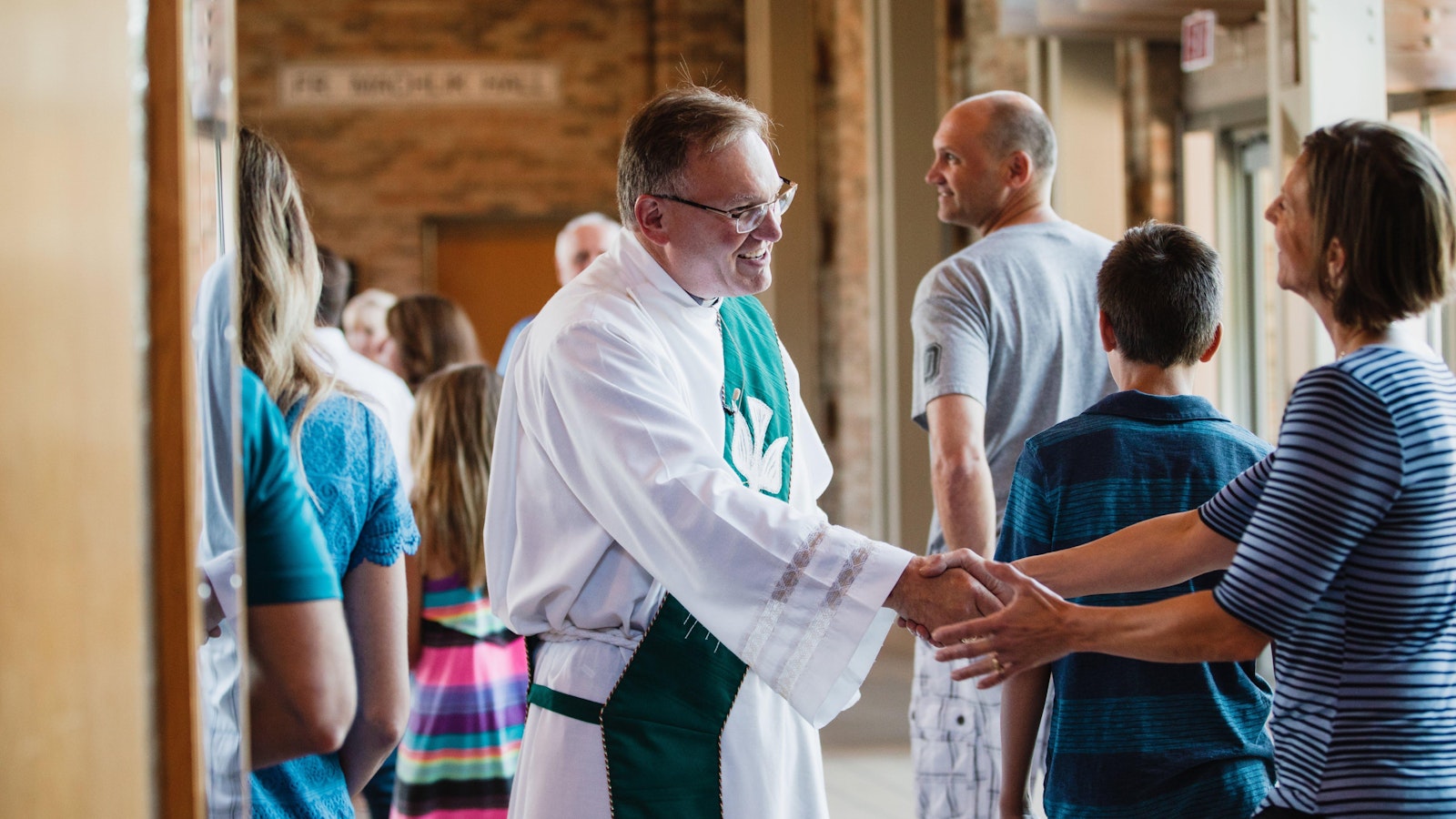
“I, then, a prisoner for the Lord, urge you to live in a manner worthy of the call you have received, with all humility and gentleness, with patience, bearing with one another through love, striving to preserve the unity of the spirit through the bond of peace: one body and one Spirit, as you were also called to the one hope of your call; one Lord, one faith, one baptism; one God and Father of all, who is over all and through all and in all.” Ephesians 4:1-6
What is ecumenism?
Ecumenism is the work of cooperation, collaboration, and unity among Christians. The term Ecumenism comes from the Greek word “oikoumene,” meaning “the whole inhabited world.”.At the Second Vatican Council, the Church renewed its commitment to this effort towards unity. Christ founded one Church. The Council Fathers recognized that division in the Church “contradicts the will of Christ, scandalizes the world, and damages the holy cause of preaching the Gospel to every creature” (Unitatis Redintegratio, 1). Since then, our popes have repeatedly insisted on the importance of Ecumenism.
Ecumenism in Detroit
Here in the Archdiocese of Detroit, we include Ecumenism as part of our Mission Direct area of Engagement because we recognize the link between evangelization and the Christian witness to unity. The commitment of churches and ecclesial communities to a renewed proclamation of the Gospel is an opportunity to bear witness together to the living God, and is a cause for hope in an increasingly secular world.
Ecumenical ministry is an opportunity to serve the social, spiritual, and economic needs of our communities by sharing resources and building relationships among churches and ecclesial communities and, together, bearing witness to God. The Holy Spirit unites us to Jesus and to one another; therefore, ecumenical efforts are wisely steeped in discernment and reliance on the Holy Spirit.
As we begin to embark on ecumenical efforts in Families of Parishes, it is important to consider what ecumenism is not. Pope Francis offers some pointers that will challenge us from creating false models of communion that do not lead to unity:
Ecumenism is not the fruit of our own human efforts; unity is a gift from God, and can only be achieved through the workings of the Holy Spirit.
Ecumenism is not uniformity. Theological, liturgical, and spiritual differences that are genuinely rooted in apostolic tradition are a treasure rather than a threat to unity.
Ecumenism is not about religious compromise.
Ecumenism does not tolerate proselytism.
Pope Francis says that proselytizing is the strongest poison against the path of ecumenism. Sometimes there is confusion between proselytization and evangelization. Proselytizing is the attempt to convert someone from one religion or belief to another through fear tactics. It’s spiritual bullying. It fails to honor our brother’s and sister’s dignity and involves high pressure talk. Proper evangelization, on the other hand, is a proclamation of Jesus without fear or apprehension. It arises out of our living relationship with Jesus through prayer, regular reception of the Sacraments, and desire to fulfill Jesus’ missionary mandate (Pope Francis, Homily, August 5, 2013).
Ecumenism in your family of parishes
Ecumenical efforts within a Family of Parishes aim to build partnerships among open and willing Christian partners, while educating pastoral staff and parishioners on the importance and need for ecumenism. What are some practical ways to approach and develop this ministry?
Reach out to Christian communities in your geographical area and begin to build relationships through shared meals and social activities.
Reflect on the needs of your community; brainstorm with your partners, and create a simple plan. Recruit volunteers to assist in projects. Don’t forget to reach out to youth and young adults.
Organize prayer services using Scripture and music. Pray together, especially at important times for the nation and the world (elections, national holidays, times of increased violence, etc.).
Exchange ministry ideas and share best practices to help build the Body of Christ.
Host common celebrations such as picnics, Thanksgiving suppers, and Valentine’s Day couple events.
Pool resources for common goals especially to support the works of mercy.
Encourage genuine hospitality and fellowship to advance the image of Christian churches in a neighborhood.
Support local missions and special projects in the geographical area.
Plan joint overseas or out-of-state mission trips.
Join forces on messaging for civic and political issues to enforce Gospel values. Work with elected officials to address community problems.
Provide opportunities to share artwork, poetry, and literature.
These are just a few ideas, but the best thing to do is to discern where the Holy Spirit is leading and how ecumenical efforts can jointly fulfill God’s will.
Ecumenism is not a new phenomenon in the Archdiocese of Detroit, and many urban and rural parishes have engaged in ecumenical ministry for many years. Families of Parishes gives us the opportunity to build on these great foundations. As we pool our resources from the parishes within our Family, we can also reach out to our brothers and sisters in Christ to make a significant impact in our communities. It makes so much sense to join forces on projects such as stocking food pantries, blanket-making, outreach to military personnel, assisting crisis pregnancy centers, and helping with vaccine clinics or literacy programs.
In the years preceding Synod 16, the Church of Detroit prayed for a new Pentecost, recalling how the Holy Spirit miraculously gifted and empowered average men and women to carry out Jesus’ missionary mandate. On that first Pentecost, the Holy Spirit united people of many different cultures so that the Gospel could be proclaimed (Acts 2:1-11). This Scripture is a great inspiration to the work of ecumenism in Families of Parishes. Let us continue to pray for a New Pentecost here in Detroit, so that all Christians in Southeast Michigan can be united for mission.
Vickie Figueroa and Chris Leach also contributed to this article.







